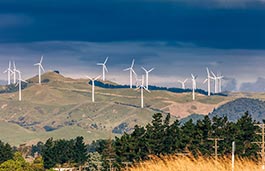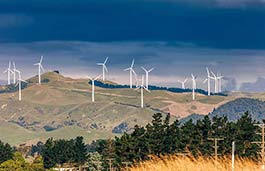Search
Geography and Environmental Hazards BSc (Hons)
Study level: Undergraduate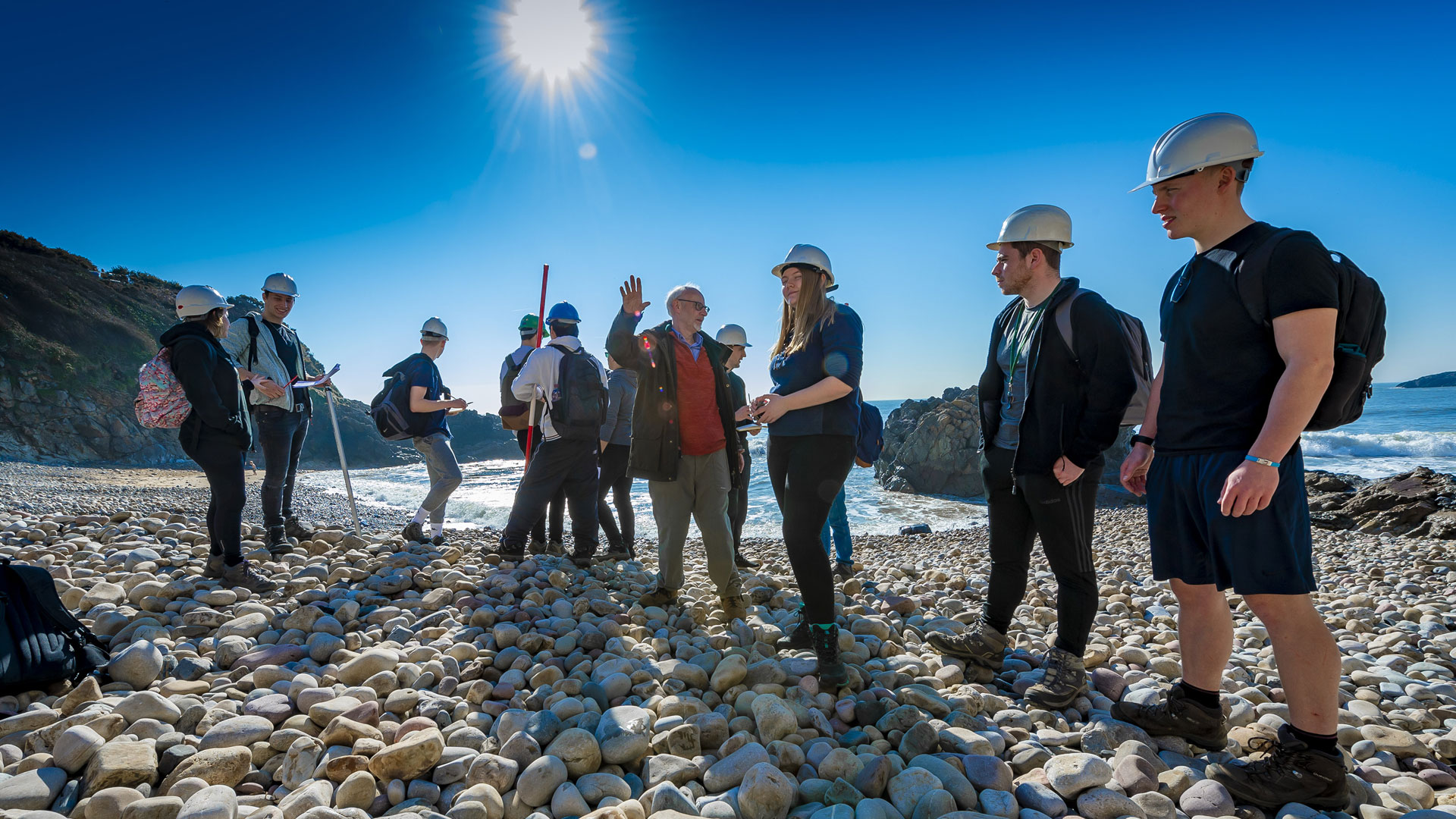
Geography is the study of the complex relationships between human societies and the physical components of the Earth.
Year of entry
Location
Coventry University (Coventry)
Study mode
Full-time
Part-time
Sandwich
Duration
3 years full-time
4 years sandwich
Flexible part-time
Course code
FH82
Start date
September 2024
Course overview
The aim of our BSc Geography and Environmental Hazards course is to provide students with the opportunity to develop knowledge and understanding of environmental hazards and the physical environment.
Rated Gold Overall
Teaching Excellence Framework (TEF) 20235 QS Stars for Teaching and Facilities
QS Stars University RatingsTop 5 Student City in England (Coventry)
QS Best Student Cities Index 2025Why you should study this course
- The BSc Geography and Environmental Hazards course, following the requirements of the QAA Subject Benchmark, has fieldwork embedded at every level, including at least one mandatory residential field trip2 to enhance their applied geographical skills. All our students will experience international mobility at least once in their programme through a mandatory international fieldtrip2. Students are required to contribute to the costs of the mandatory international field trip, the precise amount of which will vary year to year and be dependent on location and the availability of university subsidies. See fees and funding section for more details.
- There is a strong career/employability focus throughout our Geography degree courses, which is truly manifested in the four-year sandwich degree, where the third year offers the option of a year in industry or study abroad, based on our long experience of organising placements with a wide range of professional contacts2.
- Every student will acquire basic capabilities in Geographical Information Systems (GIS), a key skill sought by many employers. All students receive certificates of GIS training on successful completion of an appropriate exercise. These certificates are intended to improve the employability skills of students.
- Geography courses make use of the University’s teaching facilities including laboratories to develop quantitative analytical skills and the simulation centre, a facility that allows simulation of real-life scenarios4. This unique aspect of studying geography at Coventry facilitates an experience of fieldwork, research methods and hazard simulation, all within a monitored and recorded environment that allows students to develop skills, receive immediate feedback on their development and prepare for the transition into the workplace after graduation.
Accreditation and professional recognition
This degree is accredited1 and recognised by the following bodies:
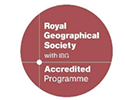
Royal Geographical Society (with IBG)
This programme has been accredited by the Royal Geographical Society (with IBG). Accredited degree programmes contain a solid academic foundation in geographical knowledge and skills, and prepare graduates to address the needs of the world beyond higher education. The accreditation criteria require evidence that graduates from accredited programmes meet defined sets of learning outcomes, including subject knowledge, technical ability and transferable skills.
What you'll study
This course has a common first year
The common first year enables you to work alongside students doing similar courses to you, to widen your knowledge and exposure to other subject areas and professions. You will have the opportunity to collaborate with other students, so you can share your insights and experience which will help you to develop and learn.
If you discover an interest in a specific subject you have studied, upon successful completion of your first year, you could swap degrees with another course in your common first year (subject to meeting progression requirements).
Common first-year courses
- Geography BA (Hons)
- Geography BSc (Hons)
We regularly review our course content, to make it relevant and current for the benefit of our students. For these reasons, course modules may be updated.
How you'll learn
You will be taught by current experienced, qualified teaching staff who bring professional and research expertise into their teaching.
The field trips, which occur in each year2, provide an unrivalled opportunity to contextualise classroom-based learning and develop practical skills through real-life application. In addition to the residential field trips, you will have opportunity to undertake a range of day trips to gain practical experience of applying your knowledge2.
This course can be offered on a part-time basis. Whilst we would like to give you all the information about our part-time offering here, it is tailored for each course each year depending on the number of part-time applicants. Therefore, the part-time teaching arrangements vary. Request further information about part-time study.
Teaching contact hours
We understand that everyone learns differently, so each of our courses will consist of structured teaching sessions, which can include:
- On campus lectures, seminars and workshops
- Group work
- Self-directed learning
- Work placement opportunities2
The number of contact hours may vary from semester to semester, however, on average, it is likely to be around 14-15 contact hours per week in the first and second year dropping to around 11 contact hours per week in the final year as you become a more independent learner.
In addition, you will be expected to undertake approximately 30-35 hours of self-directed study per week depending on the demands of individual modules. This self-directed learning allows you to use your research skills, consolidate your knowledge or undertake collaborative group work.
As an innovative and enterprising institution, the university may seek to utilise emerging technologies within the student experience. For all courses (whether on-campus, blended, or distance learning), the university may deliver certain contact hours and assessments via online technologies and methods.
Since COVID-19, we have delivered our courses in a variety of forms, in line with public authority guidance, decisions, or orders and we will continue to adapt our delivery as appropriate. Whether on campus or online, our key priority is staff and student safety.
Assessment
This course will be assessed using a variety of methods which will vary depending upon the module.
Assessment methods include:
- Formal examinations
- Phase tests
- Essays
- Group work
- Presentations
- Reports
- Projects
- Coursework
- Exams
- Individual assignments
- Laboratories
The Coventry University assessment strategy aims to ensure that our courses are fairly assessed and allows us to monitor student progression towards achieving the intended learning outcomes.
International experience opportunities
Geography is a global subject and international themes are core to our teaching. While the UK experiences natural hazards such as flooding, it rarely experiences some of the more destructive events, such as earthquakes, tsunamis and severe storms. As such, much of our teaching relies on using case studies from overseas, such as the tsunamis that regularly impact the Pacific region and hurricanes which often hit the Caribbean.
All students are offered the opportunity to complete an overseas field trip as part of their studies2. For example, past students have visited Sicily and Tenerife, where they examined the natural hazards posed by an active volcano, and to understand the measures that can be taken to address these. In all cases, the field trips are designed to enable you to see first-hand how particular natural hazards pose a significant threat in different environments, enabling you to apply your specialist research skills in an international context.
Entry requirements
Typical offer for 2024/25 entry.
Fees and funding
2024/25 tuition fees.
| Student | Full-time | Part-time |
|---|---|---|
| UK, Ireland*, Channel Islands or Isle of Man | £9,250 per year | Request fee information |
| EU | £9,250 per year with EU Support Bursary** £19,850 per year without EU Support Bursary** |
Not available |
| International | £19,850 per year | Not available |
If you choose to do a work placement2, you should consider travel and living costs to cover this. There is also a tuition fee3 of £1,250 that will cover your academic support throughout your placement year.
For advice and guidance on tuition fees and student loans visit our Undergraduate Finance page and see The University’s Tuition Fee and Refund Terms and Conditions.
We offer a range of International scholarships to students all over the world. For more information, visit our International Scholarships page.
Tuition fees cover the cost of your teaching, assessments, facilities and support services. There may be additional costs not covered by this fee such as accommodation and living costs, recommended reading books, stationery, printing and re-assessments should you need them. Find out what's included in your tuition costs.
The following are additional costs not included in the tuition fees:
- Optional international field trips: £400+ per trip.
- Any costs associated with securing, attending or completing a placement (whether in the UK or abroad).
Other additional costs
- Mandatory international field trips: Typically between £200 and £400 per trip
*Irish student fees
The rights of Irish residents to study in the UK are preserved under the Common Travel Area arrangement. If you are an Irish student and meet the residency criteria, you can study in England, pay the same level of tuition fees as English students and utilise the Tuition Fee Loan.
**EU Support Bursary
Following the UK's exit from the European Union, we are offering financial support to all eligible EU students who wish to study an undergraduate or a postgraduate degree with us full-time. This bursary will be used to offset the cost of your tuition fees to bring them in line with that of UK students. Students studying a degree with a foundation year with us are not eligible for the bursary.
Facilities
The faculty’s £50m Engineering and Computing Building and new £25m Beatrice Shilling Building are designed to support hands-on learning.
Our Sir John Laing Building also houses a variety of industry-standard labs and equipment4.
This computer laboratory is equipped with access to ArcGIS for mapping and geographical information systems. It is also equipped with Petrel/Eclipse software for oil and gas reservoir simulation and calculation4.
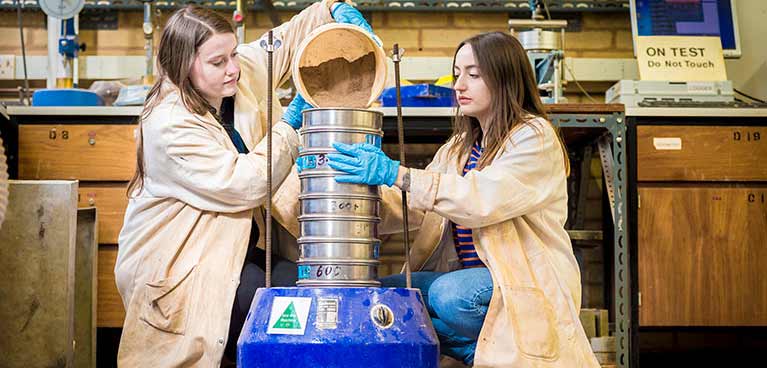
Geotechnics Laboratory
This specialist lab contains triaxial cells, direct shear box apparatus, a dimensional compression oedometer, California Bearing Ratio apparatus, soil classification equipment and Marshall test apparatus for asphalt mixes.
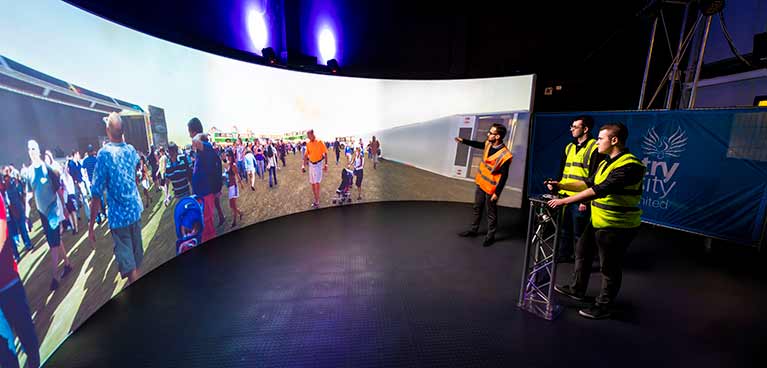
Simulation Centre
Our Simulation Centre uses an interactive screen and real-life scenarios to create a ‘virtual’ training environment. Role-play exercises are part of the course to help prepare you for situations in the workplace.
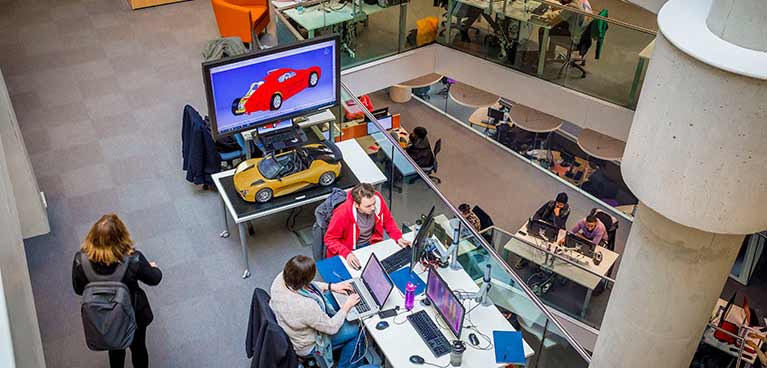
Informal Study Areas
You will have access to a range of informal study areas. These include hot-desk computers, with access to specialist software you may need for studying, and bookable spaces where you can meet with academics or work in small groups.
Careers and opportunities
On successful completion, you will be able to:
- Demonstrate knowledge and understanding of the nature, practical value and application of geography and the earth sciences.
- Recognise key concepts, methods and techniques in relation to spatial and temporal geographical problems, variations in the human and physical environments and the effect of contemporary environmental issues.
- Demonstrate a detailed understanding of natural hazards and application of knowledge to mitigate and manage their effects.
- Plan, design and execute a piece of independent research or enquiry using appropriate methods and strategies for acquiring, interpreting and analysing information.
- Conduct field and laboratory work together with data collection and associated investigative and analytical skills.
- Recognise the moral and ethical issues involved in debates and inquiries.
- Think critically and analytically about the world around you.
- Demonstrate an awareness of how skills and training can be applied to work of a geographical nature.
- Observe, contextualise and analyse information through field and laboratory studies (including computational).
- Demonstrate a range of transferable professional skills including: intellectual and problem-solving skills; effective team work; initiative and responsibility for your own learning and development; self-reflection; time management and personal organisation, and excellent communication skills.
Successful geography and natural hazards graduates should possess a number of skills that are highly valued by employers. As such, employment prospects can be good, as they should possess specialist skills and knowledge in natural hazard assessment and prevention.
The transferable analytical and problem-solving skills you’ll have the opportunity to gain as a successful geography graduate may also open up a wider variety of roles, such as a GIS officer, data analyst, flood risk analyst, sustainability officer, asset systems manager, environmental energy consultant, teacher, insurance assessor or government administrator.
Where our graduates work
Graduates from similar courses have gone on to work for the Environment Agency, the Meteorological Office, environmental departments of local authorities, utility companies including Severn Trent and EON, research institutes, charitable organisations and environmental consultancies. Others have continued their studies at postgraduate level, including teacher training and further study at master’s and PhD level.
Further study
You could choose to continue your studies at Coventry University with the Sustainability and Environmental Management MSc or Disaster Management and Resilience MSc. You may be entitled to an alumni discount on your fees if you decide to extend your time with us by progressing from undergraduate to postgraduate study.
Graduate Immigration Route visa
Based on current information from the UK Government, international students whose study extends beyond summer 2021 may be eligible for a visa under the UK Government’s Graduate Immigration Route, which will enable students to stay and work, or look for work, in the UK at any skill level for up to two (2) years. Check the most up to date guidance available to check your eligibility and any updates from the UK Government before making an application or enrolment decision.
How to apply
You may also like
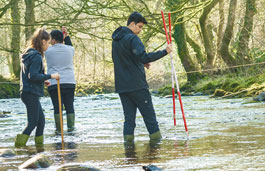
Geography BA (Hons)
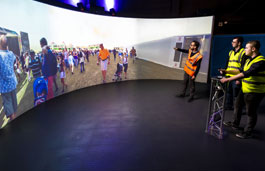
Disaster and Emergency Management BSc (Hons)
